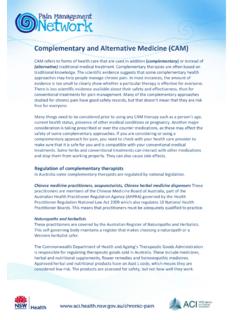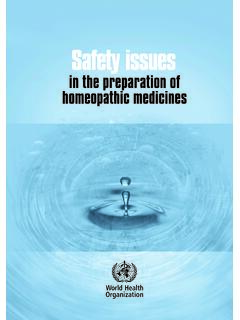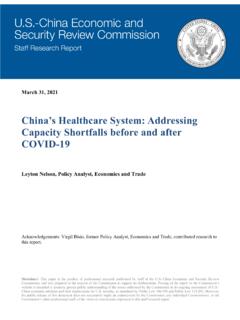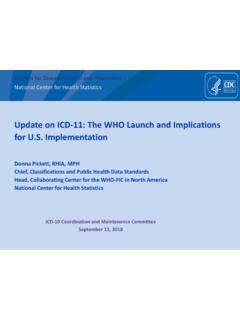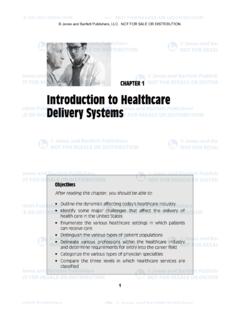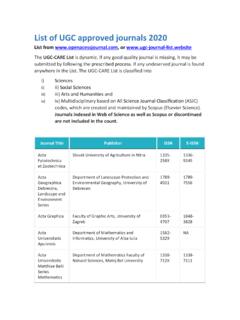Transcription of A minimal common outcome measure set for COVID-19 …
1 Published online June 12, 2020 (20)30483-7 1 Personal ViewA minimal common outcome measure set for COVID-19 clinical research WHO Working Group on the Clinical Characterisation and Management of COVID-19 infection*Clinical research is necessary for an effective response to an emerging infectious disease outbreak. However, research efforts are often hastily organised and done using various research tools, with the result that pooling data across studies is challenging. In response to the needs of the rapidly evolving COVID-19 outbreak, the Clinical Characterisation and Management Working Group of the WHO Research and Development Blueprint programme, the International Forum for Acute Care Trialists, and the International Severe Acute Respiratory and Emerging Infections Consortium have developed a minimum set of common outcome measures for studies of COVID-19 .
2 This set includes three elements: a measure of viral burden (quantitative PCR or cycle threshold), a measure of patient survival (mortality at hospital discharge or at 60 days), and a measure of patient progression through the health-care system by use of the WHO Clinical Progression Scale, which reflects patient trajectory and resource use over the course of clinical illness. We urge investigators to include these key data elements in ongoing and future studies to expedite the pooling of data during this immediate threat, and to hone a tool for future research is essential for an effective public health response during an emerging infectious 3 Research enables early description of the nature, extent, epidemiology, and prognosis of the outbreak, and guides the selection of management strategies that benefit the largest number of patients.
3 However, pandemic research is challenging because a new outbreak represents an unknown threat. Data must be accumulated rapidly to guide a response for which priorities are uncertain and the geographical reach is unknown. This information informs patient management but is also crucial for resource planning to ensure a benefit for the greatest number of people, and for public health measures to restrict the spread of disease and protect those who are directly involved in the management conclusions require reproducible and widely accepted metrics to describe the emerging threat to define the natural history (including infectivity and clinical course), to understand the spread and consequences for health-care systems, and to evaluate the effect of interventions that could modify the clinical course.
4 Because these metrics are chosen rapidly and defined and measured differently from one study to the next, data sharing across studies could be facilitated if investigators agree to collect data for a set of common outcome concept of a core outcome set has been championed by the Core outcome Measures in Effectiveness Trials A core outcome set is defined as an agreed standardised collection of outcomes that should be measured and reported for a specific area of health .5 This strategy comprises a minimal set of outcomes that can be routinely recorded, independent of whether or not the study includes primary or secondary outcomes, so that the results of clinical trials in a particular disease can be reliably synthesised and compared.
5 Collecting data for a core outcome set does not restrict the selection of primary or secondary outcome measures for a study. Rather, it ensures that specific data elements that are essential for the study of the disease are routinely collected and available. The development of a core outcome set presupposes previous experience with the disease, and so although the rationale is relevant to studies of a new disease, the method differs. In the evolving research response to an emerging pandemic, in which data are collected quickly and coordination of activities is difficult, a common minimal outcome set could be invaluable in understanding the epidemiology, evaluating therapies, and guiding a public health part of a WHO-led international collaborative response to the COVID-19 outbreak, a working group on clinical characterisation and management developed a minimum set of outcome measures for studies of the emerging outbreak.
6 We describe a rapid consensus pro-cess to create this core outcome set, drawing on input from researchers, clinicians, patients, funders, and policy of the common minimal outcome setThe initiative was led by the Clinical Characterisation and Management Working Group established by WHO as a component of the research and development roadmap process in response to COVID-19 . Members of this group comprised an international panel with expertise in clinical trials, epidemiology, virology, infectious diseases, critical care, and public health, as well as funders and policy makers. The working group met by videoconference and at a face-to-face meeting in Geneva, Switzerland, from Feb 11 to Feb 12, 2020, to discuss issues relevant to research into the clinical management of patients during the evolving outbreak.
7 We agreed that a minimal but comprehensively collected outcome set could facilitate study design and data sharing, and that this set should include information on viral burden, clinical course, and survival measured at a more distant timepoint from randomisation (eg, 60 days rather than 7 days). Our goal Lancet Infect Dis 2020 Published Online June 12, 2020 S1473-3099(20)30483-7*Members listed at end of paperCorrespondence to: Dr John C Marshall, St Michael s Hospital, Toronto, ON M5B 1W8, Canada Published online June 12, 2020 (20)30483-7 Personal Viewwas for the final product to meet a minimum set of key criteria. First, variables should be simple, objective, and readily measured across a range of health-care systems from low-income to high-income countries.
8 Second, the outcome set should capture the full spectrum of illness, from asymptomatic viraemia to complete recovery or death. Third, variables should be readily obtained and rapidly recorded. Fourth, the product should measure patient benefit, but also viral burden, and should reflect demands on the health-care system, because a health-care response during a pan demic must consider not only individual patient benefit but also the capacity of the system to provide maximal benefit to the population. Finally, the outcomes selected should be acceptable to clinicians and researchers and reliably reflect the key clinical features of the understand the spectrum of outcomes being collected, we aggregated data from all trials or cohort studies of patients with severe acute respiratory syndrome coronavirus 2 (SARS-CoV-2)
9 Infection included in the WHO International Clinical Trials Registry We further analysed clinical characteristics as reported in published series describing the outbreak in China7 9 and elsewhere,10,11 as well as data from the clinical data platform of the International Severe Acute Respiratory and Emerging Infections We then developed a candidate set of key outcome measures that were disseminated by email (MailChimp) to members of WHO expert panels and to members of clinical trials groups in critical care medicine (International Forum for Acute Care Trialists) and infectious diseases (International Severe Acute Respiratory and Emerging Infection Consortium) to seek their input on the proposed model, its elements, and calibration.
10 Responses were compiled and incorporated into a revised core outcome set. Differences were resolved by majority vote of members of the Clinical Characterisation and Management Working of clinical research databases and response to the questionnaireAs of April 21, 2020, there were 1135 planned or ongoing observational studies or clinical trials of patients with COVID-19 in the WHO International Clinical Trials Registry Although 41 different countries had registered clinical studies, 792 (69 8%) were based in China. The interventions varied and included antiviral drugs, mesenchymal stem cells, various immuno-modulatory drugs, corticosteroids, convalescent plasma, and traditional chinese medicines. Most of these studies used viral burden, mortality or length of hospitalisation, and progression or resolution of clinical symptoms as trial endpoints (table); measures of lung function were the primary endpoint in 101 (8 9%) received input from 67 individuals in response to the first mailing of the outcomes questionnaire.











